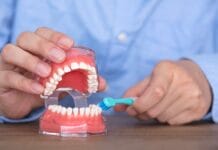There is nothing more frustrating than having a patient that makes your job extremely difficult. We all have them and we always will. Let’s face it, working with the public is challenging. In a perfect world, all of our patients can all lie back to our comfort level, open wide like a monkey, and never complain. However, this is not a perfect world, and these patients will continue to dawn our schedule. But that’s okay. There is a way to get through these appointments without downgrading your level of care and making your job harder.
One of the first difficult patients I can recall in my career was a gentleman who had a bitter attitude at every appointment.
He always presented with moderate amounts of calculus and never ceased to complain at his appointments. Finally, one day I was over it. As soon as he hit the chair, I simply asked, “Why do you hate getting your teeth cleaned so bad?” He replied, “I hate that electric thing you hygienists always use because it hurts my teeth.” Because of the amount of calculus I used the ultrasonic to assist in removing it.
It never dawned on me to ask if it bothered him or if he was comfortable. I know that sounds bogus, but I was early in my career and just assumed that if I needed this device, the patient would just have to deal with the repercussions. However, when this patient expressed how badly it hurt, I felt so thoughtless. No wonder this man was bitter to me. I am surprised he even came back routinely to see me. That day I 100% hand scaled him. Thankfully, I had a full hour appointment and was able to accomplish this task during his appointment. He was beyond happy and expressed his gratitude to me for listening to him.
While I understand that using the ultrasonic made my job easier, it didn’t keep my patient comfortable. I could have easily lost this patient, and he could have refrained from getting his teeth cleaned ever again. For all his future appointments we allotted an hour on the schedule and discussed ways to help reduce that calculus. He was never bitter again.
After that patient I began to listen to my patients more, that includes body language. I paid closer attention to their response, and I always asked if there was something I could do to make their appointment more pleasing. Blankets and neck wraps were purchased by our doctor’s wife which helped with our patients’ comfort.
Then Debbie happened.
The staff with whom I was working with came to me and briefed me on this particular patient. Before she even made it through the door, I was in knots and dreading her arrival. During introductions, she questioned where my name came from. I proudly explained how my mother was a stay at home for 20+ years to raise her four children and always loved watching daytime soaps. And so, she gave us each a name after a soap star. Mine was after Brooke on All My Children. I was not prepared for her snide comment that belittled my mother and her naming technique. I remember crying after that appointment and thinking there was no way I could see this patient again. However, being the solo hygienist of my office, I knew I had to treat her. Before too long, six months had passed, and she was on my schedule yet again. It was then I remembered a saying I had heard growing up – you can catch more flies with honey than you can with vinegar. I knew that if I ever wanted to get through this appointment, and any future appointments, I was going to have to turn on the charm.
Debbie was her usual proud self that day. I smiled and began catering to her every need. I complimented her jewelry and listened with exaggerated awe. I didn’t lean her chair back as I normally would have because she insisted that she couldn’t lie back that far. I let her hold the saliva ejector because she constantly wanted to expectorate. I reserved a cherry prophy paste just for her as it was her favorite flavor. I made sure to ask her how everything felt before I sat her up at the end of the appointment and touched up any areas she felt needed “just a little more polish.” I turned on that charm as high as it would go. Debbie raved about her appointment and complimented my efforts. By letting her believe I had let her take the wheel, I was able to win Debbie over. I never dreaded her appointments again.
I know we don’t want always accommodate patients, especially difficult ones. However, sometimes it is necessary to achieve patient compliance and to save ourselves the headache. By allowing our frustration to control us, not only makes the patient respond negatively, but represents you and the office in an ugly manner. I encourage you to take that difficult patient and turn them into a challenge and then dare yourself to accomplish that challenge. Anyone can be nice for an hour. I promise you will be glad you did.












